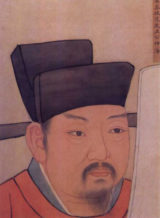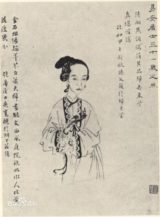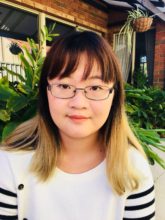Yunhe Huang translates Fan Zhongyan & Li Qingzhao
 Fan Zhongyan (989-1052) was a Chinese statesman, writer and philosopher of the Song dynasty. A significant portion of his career was spent working on China’s defences along the North-western border, which inspired the theme of loneliness in his writings. His best-known poems contrasted his experience of solitude and homesickness with a sense of duty to his country and people.
Fan Zhongyan (989-1052) was a Chinese statesman, writer and philosopher of the Song dynasty. A significant portion of his career was spent working on China’s defences along the North-western border, which inspired the theme of loneliness in his writings. His best-known poems contrasted his experience of solitude and homesickness with a sense of duty to his country and people.
 Li Qingzhao (1084-1151) lived during the Song dynasty and was considered one of the most accomplished woman poets in Chinese history. Many of her poems intimately reflect her experiences of love, loss, fear and uncertainty living in a war-torn China.
Li Qingzhao (1084-1151) lived during the Song dynasty and was considered one of the most accomplished woman poets in Chinese history. Many of her poems intimately reflect her experiences of love, loss, fear and uncertainty living in a war-torn China.
| Reminiscence Fan Zhongyan (989-1052) 碧云天, 黄叶地, 秋色连波, 波上寒烟翠。 山映斜阳天接水, 芳草无情, 更在斜阳外。 黯乡魂, 追旅思。 夜夜除非、 好梦留人睡。 明月楼高休独倚, 酒入愁肠, 化作相思泪。 Nostalgia in Autumn Fan Zhongyan 纷纷坠叶飘香砌, 夜寂静, 寒声碎。 真珠帘卷玉楼空, 天淡银河垂地。 年年今夜, 月华如练, 长是人千里。 愁肠已断无由醉, 酒未到, 先成泪。 残灯明灭枕头欹, 谙尽孤眠滋味。 都来此事, 眉间心上, 无计相回避。 Slow Song Li Qingzhao (1084-1151) 怎一个愁字了得! 寻寻觅觅, 冷冷清清, 凄凄惨惨戚戚。 乍暖还寒时候,最难将息。 三杯两盏淡酒, 怎敌他、晚来风急? 雁过也,正伤心, 却是旧时相识。 满地黄花堆积, 憔悴损,如今有谁堪摘? 守着窗儿, 独自怎生得黑? 梧桐更兼细雨, 到黄昏、点点滴滴。 这次第, | Yellow-leafed earth. On the autumn-tinted river, A green mist floats the waves. Under a sky merging into waters, Hills frame a glorious sunset. The grass stretches endless Into the sun and sky. Home-yearning soul, Travel-weary heart. Dreams, my only refuge Through these endless nights. The moonlit balcony is not for the lonesome traveller. When the wine reaches my sorrow-stricken heart, It turns to tears of longing. Blue clouded sky, Leaves fall on paved steps. In the tranquil night, I hear broken whispers of the cold. Curtains open, I linger alone on the balcony. The Milky Way drapes low across a pale sky. Every year on this night, The moonlight a silk ribbon Stretching thousands of miles. My heart is stricken beyond a drunken cure. Before wine reaches my lips, It had already turned to tears. Watching the lamp flicker as I lean on my pillow, I have long understood the taste of sleeping alone. It hovers between my brows and drifts across my heart, Refusing to be pushed away. Empty solitude, Bleak misery, Despair. I am restless as the warmth makes way for the cold. A few glasses of wine, No defence against the evening wind. Wild geese fly past my heavy heart, My old acquaintances. Petals collect in my garden, Wilted gold. Long past their prime. Standing by the window, I have no courage to face the black night. Tiny raindrops fall among silent trees, Dripping and drizzling into twilight. Everything becomes one word: Sorrow. |
|---|
Translator’s note
I have selected three ci poems from the Song dynasty under a common theme of coping with loneliness. The ci was traditionally a form of song, which later evolved into written poetry with a unique lyrical quality. In order to capture the musical quality of these poems, I used a more liberal approach in my translation and re-created them in a more contemporary style using the English language. My aim was to show the rhythm of language in these poems, which is often lost in traditional literal translations of classical Chinese poetry. I had chosen to de-emphasize the exotic setting of these poems in my translation in order to highlight loneliness as a human condition common across all cultures. In particular, Li’s poem reminded me of English-language confessionalist women poets, and the form and language used in the translation was intended to reflect that similarity.
 Yunhe Huang is a Chinese writer based in Australia. She has written poetry and prose in both Chinese and English, using a variety of genres from Song-dynasty ci to American confessionalist poetry. Translation has been her passion since childhood, with a special interest in translating poetry from Chinese to English. Her original poems have appeared in Dubnium.
Yunhe Huang is a Chinese writer based in Australia. She has written poetry and prose in both Chinese and English, using a variety of genres from Song-dynasty ci to American confessionalist poetry. Translation has been her passion since childhood, with a special interest in translating poetry from Chinese to English. Her original poems have appeared in Dubnium.